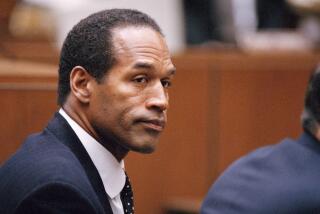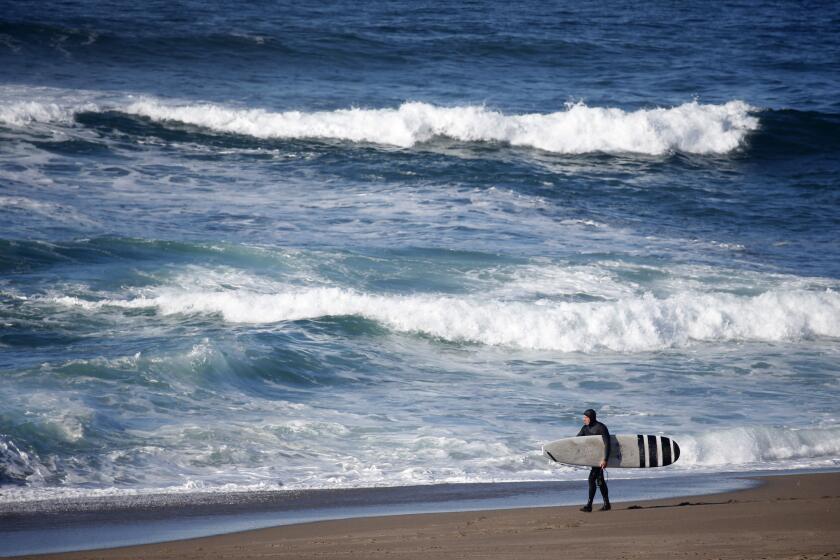Anger over Trayvon Martin’s slaying transcends the issue of race
It’s an outrage even if you look past race — even if Florida vigilante George Zimmerman does claim a Latino mother and a few black friends.
Zimmerman’s ethnicity can’t excuse the killing of Trayvon Martin. And it doesn’t obliterate the racial slur that Zimmerman muttered on the 911 tape as he chased down the black teenager.
The case has roiled the Orlando, Fla., suburb where Trayvon was shot to death last month by Zimmerman, a Neighborhood Watch leader who became alarmed when he spotted Trayvon walking through the gated condominium complex that Zimmerman spent aimless days and nights patrolling.
Zimmerman hasn’t been arrested, claiming self-defense under Florida’s Stand Your Ground law. Now protests are spreading across the country, turning Trayvon’s death into a national symbol of racial prejudice and violent bias.
But this is not just about the color of skin, but the color of authority.
It’s about a neighborhood bully allowed to carry a gun, encouraged by a reckless law to wield it and absolved by local police, who had barely begun to investigate before declaring the killer “squeaky clean.”
Does race play into it? Certainly. I have no doubt Trayvon would be behind bars if he’d been the shooter in that scenario.
But what is moving America now owes its resonance to a bag of Skittles, a can of iced tea and a hoodie pulled low against the cold.
And the heartbreaking photo we can’t seem to avoid, of a bright-eyed kid in a Hollister shirt smiling broadly into the camera, who was shot to death walking to his dad’s home by someone who felt he didn’t belong.
::
It took weeks for the Florida case to find its way to the national stage. Now the details seem to be everywhere.
Social media is tailor-made for its compelling iconography — who can’t relate to a teenager armed only with Skittles and AriZona iced tea. And Zimmerman becomes distastefully real in his scruffy police mug shot, from an arrest in 2005, and his sullen voice on the 911 tape when he reports a “suspicious” man wearing sneakers and a hoodie.
“Looks like he’s up to no good. …” Zimmerman told the dispatcher. “This guy’s hand is in his waistband, and he’s a black male.”
Trayvon’s girlfriend said he called her about that time on his cellphone, worried because a strange man was following him. She told him to run away. A few minutes later, neighbors heard a scuffle and a shot, and 17-year-old Trayvon was dead.
Anger in suburban Sanford was immediate. Since then, thousands have turned out for rallies, the police chief has temporarily stepped down and separate federal and state investigations have begun.
The national push got its start with an online petition begun by Trayvon’s parents demanding that Zimmerman be prosecuted. It drew 600,000 signatures in one day. Now, busloads of people are traveling to Florida protests from Southern cities like Atlanta. And hundreds took to the streets in New York City, chanting “We are Trayvon Martin” after a “Million Hoodie March” was posted on Facebook.
And here in Los Angeles, hundreds are expected at a rally in Hollywood on Saturday and another one in Leimert Park on Sunday.
It’s a response that seems to transcend race and age and politics.
Locally, it even had KFI-AM radio talk show hosts John Kobylt and Ken Chiampou lining up on the same side as the Rev. Al Sharpton, their perpetual target.
A few weeks back, they were in trouble for racially insensitive remarks about Whitney Houston. Now they’re calling for justice for Trayvon Martin.
You can’t pick a fight with an unarmed kid, they said, then claim you feel threatened enough to shoot him.
::
On Thursday night in Los Angeles, hundreds of people, most of them black, gathered at Leimert Park in the Crenshaw District. They prayed out loud and waved protest signs. Vendors hawked bean pies and Obama caps. Scattered chants of “No Justice, No Peace” were mostly drowned out by “What’s Going On,” the Marvin Gaye classic touting peace and love.
When a police helicopter began hovering, drowning out the speech-making, somebody broke through the tension and hollered, “Wave your Skittles at them!”
I felt more weariness than anger as I walked through the crowd. “It’s not about Zimmerman and what was in his mind,” one middle-aged man with dreadlocks told me. “We’re not going to get rid of racism. All we’re asking is that the justice system work.”
But then that’s all we have ever asked.
The ordinariness of it all hits many of us like a blow to the chest. Even President Obama said as much: “If I had a son, he would look like Trayvon,” Obama told reporters Friday. “All of us have to do some soul-searching to figure out how does something like this happen.”
To own it, we have to realize that the profiling that doomed Trayvon is a daily reality for young black men. And we also have to accept that this is about more than skin color.
I think the young people get it, even if the rest of us are still busy arguing about whether Zimmerman is white.
I came home late from Thursday night’s protest dispirited and ready to unload on my college student daughter about Trayvon’s death and racial injustice and all that is not being done.
It turned out she had been online for hours, tracking Facebook posts and news accounts. She’s never been the protesting type, but she was making plans to march this time. She showed me pictures of white kids taking to the streets in New York in hoodies, hoisting bags of Skittles.
“It’s not about race anymore,” she told me when I asked why so many people seem to have made Trayvon a martyr.
“This is about justice. A crazy man who shot a kid who wasn’t bothering anyone.”
You don’t have to be black to know that’s wrong.
More to Read
Start your day right
Sign up for Essential California for news, features and recommendations from the L.A. Times and beyond in your inbox six days a week.
You may occasionally receive promotional content from the Los Angeles Times.






